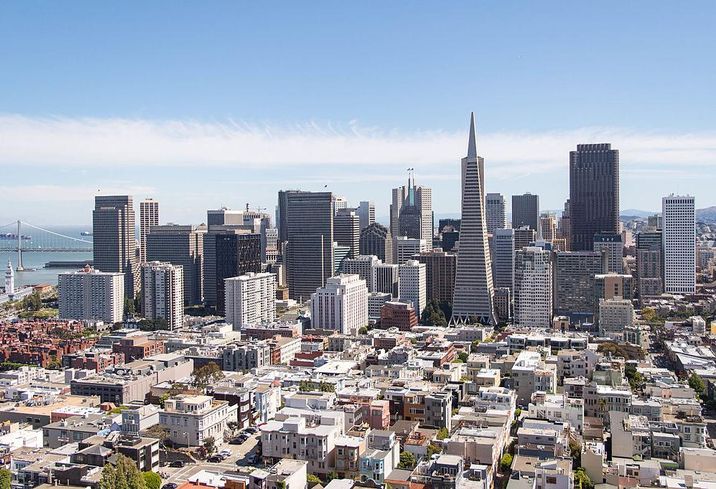Report: Despite Expected Slowdown, Tech Office Will Dominate 2016
In 2016, the tech industry will continue to drive office demand in the Bay Area after five years of strong growth that has pushed down vacancy rates and driven up rents. We chatted with CBRE director of research and analysis Colin Yasukochi to get all the details.

Colin tells us the office market is relatively tight in most markets throughout the Bay Area with the tech industry driving a lot of the demand. That's Colin in his office on the 44th floor of 101 California St.
Here are some highlights from CBRE's recent report:
- 36% of all Bay Area office stock is occupied by tech firms;
- 60% of all leasing activity in the first three quarters of last year was by tech firms;
- Rents ($70/SF in San Francisco and $51/SF in Silicon Valley) have reached near dot-com peaks and vacancies have remained tight;
- Silicon Valley continues to dominate tech, with 73% of the Bay Area's 172M SF of space occupied by tech firms;
- San Francisco follows at 13%;
- San Francisco has a larger proportion of tech tenants (16%) that are unicorns (startups valued at $1B or more), compared with 1.1% in Silicon Valley.
Colin expects the rate of growth will slow down this year after five years of strong growth, but the Bay Area will continue to be one of the strongest growth markets in the country.
He says people don't realize what a big difference there is in the tech occupancy of Silicon Valley and San Francisco, the two strongest tech markets in the Bay Area. While San Francisco draws a lot of tech attention, Silicon Valley still dominates in terms of sheer square footage occupied by tech companies.
As for the proportionately large concentration of unicorns in San Francisco, Colin tells us there are several reasons. In the past, many startups concentrated in Palo Alto (and many still do), but once they grew to a certain size, they had to look for space outside of that market.
In San Francisco, he says, companies can start small and grow into something substantial. San Francisco also supports a strong startup environment with an urban setting that appeals to tech workers and a fertile testing ground for many of the products and services those companies are developing, Colin tells us.
And, while we've reported about concerns that some unicorns could fail this year, Colin says there isn't anything systemic that poses enormous risk to unicorns in particular. With unicorns occupying just under 5% of San Francisco's total office space, they still make up a relatively small amount in the city, even though it is the largest concentration in the Bay Area.

This year there may be more tech companies that look to the East Bay for office space, which now has about 5% of the Bay Area's total tech occupancy, Colin tells us.
There are a lot of tech employees who live in the East Bay and many companies like to have offices in areas where employees are located, he says. The cost of real estate in the East Bay also is lower and the cities tend to be well-served by transit, which is a plus, he says.
Uber found the space it needed with its purchase of the Sears Building (in the lucrative deal we told you about for the JV behind the property), now Uptown Station, above. But, Colin cautions, the East Bay market is relatively small and large tenants likely won't find the space they need there and will continue to focus on Silicon Valley and San Francisco.

